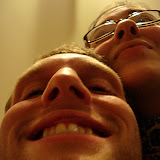Feb 8, 2008
Walking like an Egyptian
I've decided that one interpretation of the phrase "walk like an Egyptian" means choosing to walk on the street instead of the sidewalk. It also means when crossing a busy street you must simply step out in front of oncoming traffic in faith that no one is going to hit you. One explanation for why Egyptians walk in the street is because often there are cars parked on the sidewalk. Another explanation that an MCCer heard somewhere is that they don't want to be mistaken for tourists. :-)
I guess I'll try to summarize the past several days with small extraordinary tidbits that stood out to me since it's hard to condense everything that's happened.
First tidbit: Many Coptic Orthodox Christians in Egypt have a cross tattooed on their hand or wrist. It's like an identity mark.
We just returned from a trip to Upper Egypt in a town called Maghagha where MCC supports the Coptic Orthodox Church and their adult literacy program. Because it is a town outside of Cairo and rarely frequented by foreigners, our visit was an exciting one for us and for the people there. I wasn't surprised at their amazing hospitality; we drank many cups of tea and coffee and were always ushered to the front when entering a room.
Egyptians are not shy, and it wasn't long before I had a crowd of people around me asking my name and where I was from. I was asked to pose with people for several cell phone cameras and I even received a really cool cross pen that lights up when you write. One of the priests there said that I was like a little biscuit and that everyone just wanted to eat me up. I thought it was a funny analogy. I don't think I have ever been called a biscuit before. He also called Tim "lightening", I guess because everyone was so eager and excited to be interviewed by him.
Second tidbit: Most taxis in Egypt run on natural gas and they are color coated according to whichever city you're in. Also, you don't negotiate a price ahead of time. You say where you want to go and you pay the price you want when you arrive, and you judge based on how far and how long it took. Sometimes the drivers will argue with you, but usually they don't as long as you're firm. It was strange to me b/c I haven't been anywhere yet where the taxis function that way. Luckily we were always with someone who lived in Cairo so we didn't have to do the bargaining ourselves.
You know, it's sometimes hard to help people understand the importance of time when telling a story with photographs when I travel. The amount of time spent in one place is important and so is the time of day, especially for outdoor photos. Usually the majority and focus of our time revolves around the writer's interviews and in most cases I sit and listen and then wander around taking photos of whatever is happening or interesting. Occasionally I will pose photos if we are looking to show specific, literal examples, like people reading books to illustrate the story on the literacy programs.
In Maghagha it was difficult to find time to explore the town with all of the formalities and it was hard to demand that our schedule allow more time for my photographing desires. I've realized that there are advantages and disadvantages to being a young woman and small in stature: the advantage being that I am quite approachable and I think people feel more at ease and the disadvantage being that sometimes I don't think I'm always taken seriously. I may be completely wrong, but that is how I would see it. It probably doesn't help much that I'm not very assertive and would rather blend in to the background in most cases.
Third tidbit: In Egypt, everywhere a church is, a mosque is there also. I think it's even a law that there can't be a church without a mosque somewhere close beside it. James pointed out several mosques in construction that were being built in response to newly built churches.
Fourth tidbit: In Maghagha I was very impressed to hear that there is a good mix of Christians and Muslims in the literacy classes. Of course the majority are Christian because it's run through the Coptic Orthodox Church, but it was encouraging to hear that the relations between Christians and Muslims are very good in the town there. An 18 year-old woman stood up in one of the crowded classes we visited and said that she is a Muslim and she used to hate Christians, but after taking the literacy classes she got to know them and understand them and now she loves them. Everyone applauded her after she spoke. I thought it was quite powerful.
I hope you enjoy the slideshow. Most of the photos are from the tourist stuff we saw, but I threw in a few from our visits to the literacy programs. They are in random order.
Subscribe to:
Post Comments (Atom)



No comments:
Post a Comment